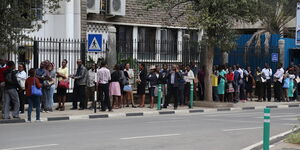Major Kenyan roads have seen a significant drop in traffic jams two months after the Energy and Petroleum Regulatory Authority (EPRA) increased Value Added Tax (VAT) on fuel from 8 per cent to 16 per cent.
According to Nairobi motorists, the time spent maneuvering on busy highways such as Mombasa and Lang'ata roads at peak hours has reduced by up to 30 minutes from a high of two hours.
Motorists Association of Kenya (MAK) Chairman Peter Murima, in an interview with Kenyans.co.ke, attributed the drop to the July 1 spike in fuel prices.
Murima noted that along the Eldoret-Nakuru Highway, which he uses regularly, the number of personal vehicles had decreased, with many resorting to public service vehicles as high energy prices bite.
"You can see there is less traffic on the roads. Where we are standing, this road used to experience traffic jams. I can count the personal vehicles and most of them are providing essential services," the chairman stated.
"This also shows there are fewer economic activities and traveling has become a little bit expensive forcing commuters to limit their travel which is not very good in the Transport sector."
Before the spike, Murima noted that the country consumed northwards of 20 million litres of petrol every month, a figure that has since dropped attracting the attention of oil marketers.
"When the economy was good, we used to consume 20 million litres of petrol but right now, the consumption is quite low that there is a report being done by the oil marketers," he added.
"When the sales are high, the government revenue is high and when it dips, it affects the state's revenues. It is prudent to make the prices lower through policies to ensure that the revenues remain high."
In Kenya, Super Petrol, Diesel, and Kerosene currently retails at Ksh194.68, Ksh179.67, and Ksh169.48 respectively.
This was a steep increase from Ksh182.04 for petrol, Ksh167.28 (diesel) and Ksh161.48 (kerosene) from June 2023.
After the price spike, the association, which boasts of a membership of 300,000, embraced carpooling as a mode of transport for its members and estimates that 30 per cent of them either turned to PSVs or car-sharing initiatives.
Reduced State Revenues
Murima observed that with the reduced consumption, the state was losing a significant slice of revenues. For instances, 70 per cent of matatu earnings were spent on fuel, which attracts as high as 50 per cent taxes per litre.
The Matatu Welfare Associations Chairman Dickson Mbugua corroborated with his MAK counterpart by confirming a slight increase in PSV passengers.
Whereas he did not attribute the increase to departure from private cars, he confirmed that the fuel prices was a factor. The motorists were torn between providing for their families and maintaining their cars on the road.
"There is a slight increase. I wouldn't say it is a big shift from private motorists to matatus but there is a slight change and that is why the traffic jams are not prolonged these days. Even the cost of living has affected the motorists who are torn between driving cars and putting food on the table," he explained.
"The revenues in matatu have slightly been boosted leading to an influx of matatus."
It is estimated that revenues within the industry increased by 10 per cent, attributable to a surge of customers and increase in fares.
According to the Nairobi Metropolitan Area Transport Authority, Nairobi traffic jam costs the Kenyan economy Ksh144 billion per year.












